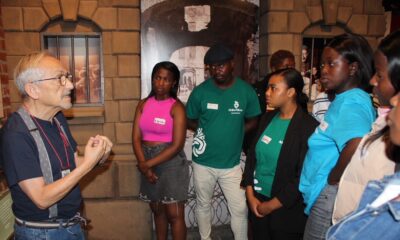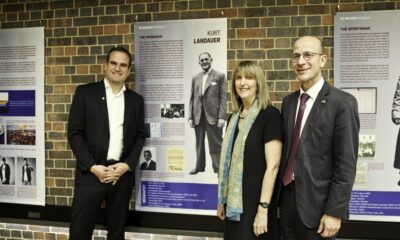
Featured Item

Lost in Shoah, found after lockdown – an extraordinary family reunion
It was just a momentary sense during lockdown in 2020 that led Michalya Schonwald Moss to finding a long lost cousin who had survived the Holocaust and who believed she had no surviving relatives.
“I was sitting in a Sukkah, and I suddenly sensed my ancestors in that space,” says Schonwald Moss, an American who made aliya and moved here after marrying her South African husband. She was inspired to find her family’s roots. The result reunited the fragments of her family scattered by the Holocaust.
Through this process, Schonwald Moss discovered a cousin, Alice Grusová, who had been wrenched from her roots and lost touch with her Judaism during and after the Shoah. Her parents left her on a bench as they escaped the Nazis, and so she lost touch with her biological family. Her survival defied all odds.
Now that she has reconnected to her family, meeting kin she never knew, she has also rediscovered her Jewish identity.
“It was a miracle I survived. It was a very brave act by my mother,” said a sprightly Grusová from her home in Prague, in the first reunion with her new family members on Zoom. In the same meeting, Schonwald Moss’ father, Rabbi Joseph Schonwald said Shehechiyanu, thanking G-d “who has kept us alive, sustained us, and brought us to this moment”.
Schonwald Moss recalled feeling that as South Africa went into lockdown, it was as if the world was ending. “As a third-generation Holocaust survivor, it felt like I had to prepare for the worst,” she said. This unease led to her journey of discovery.
She initially found a record of a woman named Klára, who was Schonwald Moss’ great-grandmother, Jolán Schönwald’s sister. Schonwald Moss hired genealogist Peter Absolon, who discovered that Jolán, Klára, their brother, Nathan, and their sister, Irén, had all perished in the Holocaust.
Schonwald Moss didn’t know of their existence because her grandfather, Moshe (Jolán’s son), never spoke of them or how he survived. “Irén had two daughters, Marta and Edita [or Edith]. Alice, born in Prague in May 1941, was Marta’s daughter.” Marta and her husband, Alexander, were murdered in Auschwitz, but Edita survived and went to Israel.
“Peter told me that Alice was still alive, 81 years old, and living in Prague. I cried – the Holocaust was so much a part of my life that I didn’t even know where it ended and I started. And now, here was someone who had experienced it, was alive, and related to me – my second cousin once removed.
“My mother is a very open-hearted person,” says Alice’s son, Jan. His mother worked as a paediatric nurse and later in a kindergarten. “Now, she’s enjoying being a grandmother to six grandsons and three great-grandsons.” He is the youngest of Grusová and her husband, Miroslav’s, three sons. He says his mother’s initial reaction was shock at the news that she had undiscovered family members. She was sad to find this out so late in life.
Twenty-four hours before Schonwald Moss and her family met Grusová over Zoom, “we found out that she has a first cousin alive in Israel – Edita’s son, Yossi Weiss”, says Schonwald Moss.
“Every family with Holocaust survivors has secrets, some that are kept on purpose and some that survivors just couldn’t talk about,” says Weiss. He suspects that the existence of his cousin was the latter.
He now knows that Grusová was left on a bench as her parents tried to flee the German Protectorate of Bohemia and Moravia (now the Czech Republic) in 1942. However, he doesn’t know if they left her before they departed, or when they were arrested. How her identity stayed with her is unknown, but the family suspects the connection may have been made when her parents were interrogated and then recorded in the Nazis’ meticulous documentation.
Grusová was cared for in a Jewish orphanage, and later taken to the Theresinstadt ghetto (or Terezin). Somehow, she remained safe, even after contracting typhus. Grusová recalls being hidden behind a wall by a German nurse when she was ill. The family suspects that she was at Terezin at the same time as her parents, and her parents may have known this but couldn’t see her. Later, they were murdered at Auschwitz. Grusová survived, and was reconnected with Edita, who survived Auschwitz, but with many internal and external scars.
“There’s a picture of them together – my mother looks like a teenager,” says Weiss. He doesn’t know why his mother left Grusová behind when she made aliya. “I heard my mother speaking about Marta and maybe mention Alice, but I didn’t know I had a first cousin. So, discovering Alice felt like a miracle. Ever since, I have wondered ‘what if’. I could have had a ‘big sister’.”
The lost connection with her aunt Edita is possibly the one that has affected Grusová the most. Weiss says his mother “came back and everyone was dead. Her husband froze to death in Siberia. As a single woman trying to piece together her life, maybe she couldn’t adopt her or the authorities wouldn’t let her. But she stayed to ensure Alice found a good family.” Grusová’s son says his mother was adopted by a Czech Jewish couple who survived the war by being in England.
Also, said Weiss, “Palestine was like a war zone. They lived in an absorption camp, and later three families to an apartment. She may have not wanted to take Alice into another unstable environment.” Why Edita stopped communicating with Grusová is also unknown, but it may have been because her niece was behind the Iron Curtain.
Weiss says that when Grusová visited Israel in July to meet her newfound family members, he ensured they discussed the pain caused by Edith’s decision. “It was healing for both of us,” he says. Weiss also took her to visit his mother’s grave. “My mother had cancer. She said, ‘I’m not afraid of death. I already died in Auschwitz. Being dependent on others scares me.’ So she took her own life.” Tragically, Weiss’ son also died by suicide.
The cousins visited places around Haifa where Weiss grew up, such as his mother’s perfumery. Weiss, Schonwald Moss, Grusová, and their families toured Yad Vashem and visited the Kotel. “She signed testimonies for her parents and brother [from her father’s first marriage] at Yad Vashem,” says Schonwald Moss. Her brother’s name was René, but was registered as female, so we got to correct that. He was 16 and died in Auschwitz.”
Grusová’s son says she lost her connection to Judaism living under Communist rule, but the reunion has brought Judaism back into her life. Before this, Grusová wasn’t known to Prague’s Jewish community and The Conference on Jewish Material Claims Against Germany, which ensures reparations for survivors. This has now been restored.
Grusová will be interviewed by Steven Spielberg’s foundation, and has been invited to speak at a Holocaust Memorial Day event. A South African production company will make a documentary about her life, and the family plan to have their next reunion in Prague. They talk regularly.
“Make space for your ancestors,” says Schonwald Moss. “Being in Africa, it’s part of the culture, and we can do more to incorporate this into the way we honour those who came before us. When it comes to the intergenerational trauma, repair is possible – but it takes courage. The connections are there to find.”










